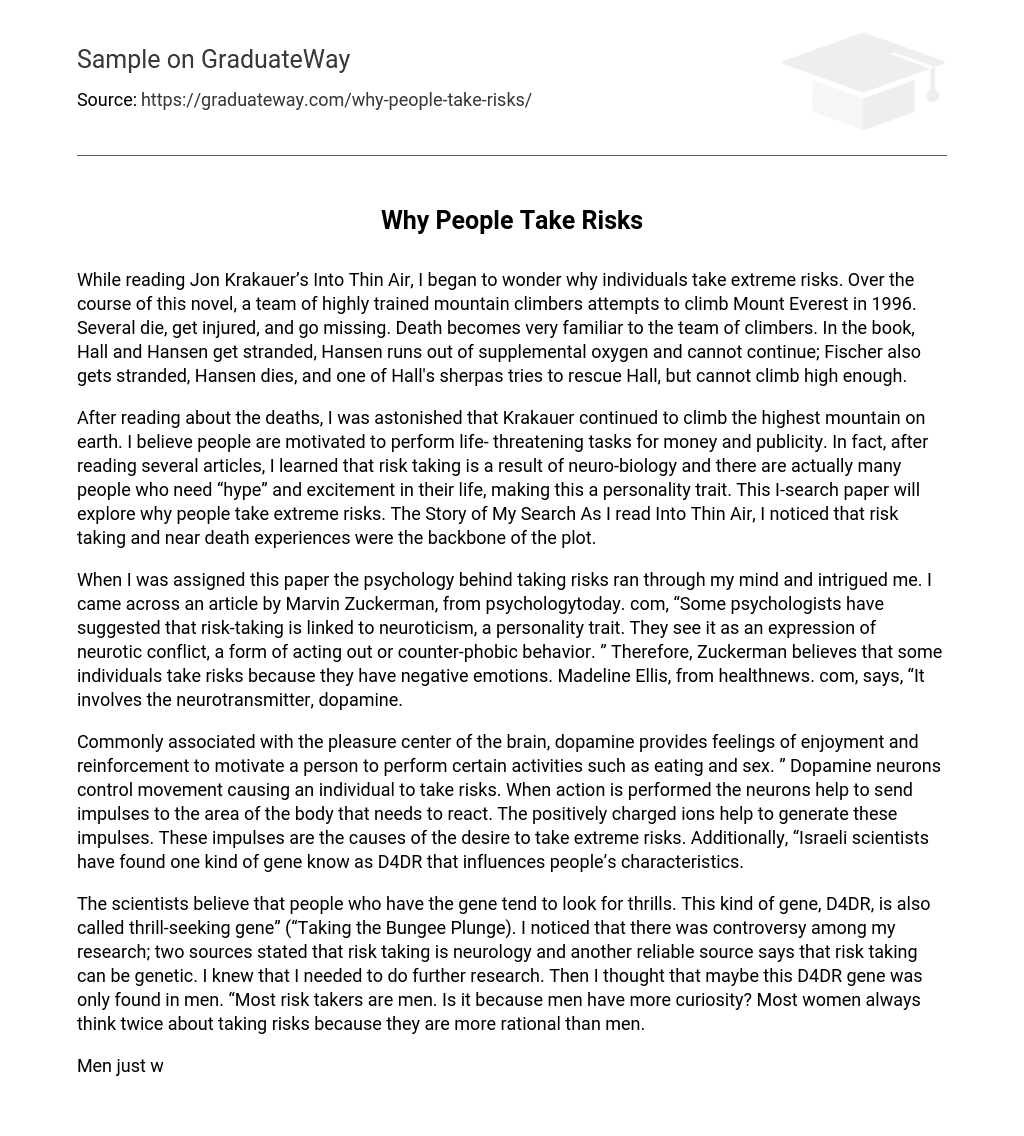While reading Jon Krakauer’s Into Thin Air, I began to wonder why individuals take extreme risks. Over the course of this novel, a team of highly trained mountain climbers attempts to climb Mount Everest in 1996. Several die, get injured, and go missing. Death becomes very familiar to the team of climbers. In the book, Hall and Hansen get stranded, Hansen runs out of supplemental oxygen and cannot continue; Fischer also gets stranded, Hansen dies, and one of Hall’s sherpas tries to rescue Hall, but cannot climb high enough.
After reading about the deaths, I was astonished that Krakauer continued to climb the highest mountain on earth. I believe people are motivated to perform life- threatening tasks for money and publicity. In fact, after reading several articles, I learned that risk taking is a result of neuro-biology and there are actually many people who need “hype” and excitement in their life, making this a personality trait. This I-search paper will explore why people take extreme risks. The Story of My Search As I read Into Thin Air, I noticed that risk taking and near death experiences were the backbone of the plot.
When I was assigned this paper the psychology behind taking risks ran through my mind and intrigued me. I came across an article by Marvin Zuckerman, from psychologytoday. com, “Some psychologists have suggested that risk-taking is linked to neuroticism, a personality trait. They see it as an expression of neurotic conflict, a form of acting out or counter-phobic behavior. ” Therefore, Zuckerman believes that some individuals take risks because they have negative emotions. Madeline Ellis, from healthnews. com, says, “It involves the neurotransmitter, dopamine.
Commonly associated with the pleasure center of the brain, dopamine provides feelings of enjoyment and reinforcement to motivate a person to perform certain activities such as eating and sex. ” Dopamine neurons control movement causing an individual to take risks. When action is performed the neurons help to send impulses to the area of the body that needs to react. The positively charged ions help to generate these impulses. These impulses are the causes of the desire to take extreme risks. Additionally, “Israeli scientists have found one kind of gene know as D4DR that influences people’s characteristics.
The scientists believe that people who have the gene tend to look for thrills. This kind of gene, D4DR, is also called thrill-seeking gene” (“Taking the Bungee Plunge). I noticed that there was controversy among my research; two sources stated that risk taking is neurology and another reliable source says that risk taking can be genetic. I knew that I needed to do further research. Then I thought that maybe this D4DR gene was only found in men. “Most risk takers are men. Is it because men have more curiosity? Most women always think twice about taking risks because they are more rational than men.
Men just want to feel extremist, take things to the edge, and get their adrenaline up high” (“Why Do People Like To Take Risks”). “The “novelty-seeking” or lust for excitement may be linked to a D4DR gene on chromosome 11” (“The Social Gene). This article does not say anything about whether or not it is more abundant in males. It explains that individuals with longer strands of this gene feel the need to take extreme risks, and others with a shorter strand are very cautious. After reading various articles, I was able to draw conclusions and learn a lot about the psychology behind risk taking.
The Search Results After a tedious research process, I never got a strait-forward answer to: Is taking extreme risks psychology or genetics? I did learn that there is a gene that causes people to have the desire to take risks. I think that this gene is activated by the dopamine neurons, which creates “risk taking impulses. ” For example, my brother, Jake was given the option to study abroad this semester and he turned it down. He turned it down because he would be taking the risk of going to another country, which they have to deal with strangers, a new culture, a new language, and different kinds of food.
It’s a very big difference from what they are used to. Many people don’t feel comfortable stepping outside of their comfort zone, which probably has a lot to do with impulses sent to the brain. If you cup your hands without thinking about it, you feel comfortable and this feeling is normal to you. When you flip the position of your hands, this feeling becomes uncomfortable because it is outside your comfort zone. I know cupping your hands is not as extreme as climbing a mountain, but it shows that risks can be extreme or miniscule; they all derive from desire and impulses. What I Learned
In conclusion, I understand that some people take risks because of different reasons based on what that they think or want to get from the risk they are going to take. It could be good for their mental or physical health or maybe both. It can also be detrimental depending on the outcome of the task. I also think that if an individual steps outside of his/her comfort zone, he/she will grow to become someone that is mentally inclined and socially skillful. Furthermore, I learned that genetics and neurology have a dependent correlation and feed off of each other to help a person make decisions.





